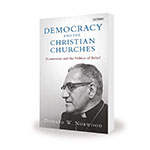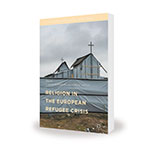Reviews - March 2019 - Reform Magazine
She’s different from us
Border
Directed by Ali Abbasi
Certificate 15, 110 minutes
Released 8 March
Tina (Eva Melander) works at a port for the Swedish customs service and is able to sniff out illegal items, be they alcohol smuggled by underage drinkers or paedophile porn images hidden on a mobile phone sim. One day she meets Vore (Eero Milonoff) who looks a lot like her. Tina is convinced he’s hiding something, but a body search by her male colleague reveals no contraband.
Outside of work, she lives in a secluded woodlands house in an uneasy relationship with Roland (Jörgen Thorsson) who breeds dogs. Through a series of chance meetings, however, she falls in with Vore and realises that the two of them have a great deal in common. Meanwhile, amazed at her unusual ability, the police have co-opted Tina’s services in trying to crack a paedophile ring where they have as yet no evidence against the suspected members.
Tina is a woman whose appearance is a long way from conventional ideas of beauty. She’s fascinated by insects and enjoys walking and wandering barefoot in the forest. She’s not someone you can imagine fitting in with an urban setting. Her job involves dealing with people passing into one country from another while her rural home life is fairly isolated and self-contained. She isn’t much of a social animal at all.
Sweden’s Oscar entry for best foreign film is all about how we value people who are different from us and don’t fit any familiar mould. It starts off (and completely delivers) as a Scandi-thriller about uncovering illicit child sex rings but also turns into something far more complex as it probes very difficult areas of the human condition, both personal and social.
Just when you think you know where the narrative is going and what the director’s intentions are, a scene suddenly pulls the rug from beneath your feet and leaves you completely disoriented. I’d advise you not to read other reviews because there’s an element here it would be criminal to reveal. It’s an extraordinary and hugely challenging movie about those seemingly unremarkable people you might be tempted to write off but really shouldn’t.
Jeremy Clarke is a film critic
___
Christians on governance

Democracy and the Christian Churches: Ecumenism and the politics of belief
Donald W Norwood
IB Tauris
£85 (hardback)
ISBN: 9781784538323
This careful overview is the fruit of considerable reading and research into what Christians (mainly from the Catholic and Reformed traditions) have said about governance and participation in Church and state. It has two parts – principles and practicalities – and aims ‘to bring together concern for Church reform and the ordering of society’.
The first chapter offers an overview of the 14 ‘most influential Reformed theologians’ from Calvin to the present, all affirming the sovereignty of God as the guard ‘against tyranny and tumult’, though (unsurprisingly) tending towards trusting the people rather than the monarch. Norwood has found a splendid quote from Jacques Ellul: ‘Our parliamentary and electoral system and political parties are as futile as dictatorships are intolerable’ – one of several side swipes at Brexit scattered through this book!
The chapter on Rome’s reforms and reservations mainly draws on official documents, encyclicals and pronouncements, though less official voices are also interpreted. Though the authority of the Pope is a constant (though subtly changing), the role and voice of laity has been a matter of increasing discussion. Unlike the Reformed Churches (apart from the Dutch Reformed Church in South Africa) Rome has sometimes tended to align with dictatorships, though the canonisation of Oscar Romero, whose picture appears on the cover of this book, implies a change.
Part two of Norwood’s book dives into specific governance issues (accountability, equality, decisionmaking etc). It includes a splendid chapter reviewing ‘democracy, women, church and the Bible’ (which fails to mention Elsie Chamberlain on the BBC!) and a necessarily brief chapter on multifaith engagement. The ‘Church and theology in the public square’ chapter can be read as a helpful essay addressing this book’s underlying issue: how can authentic Christian commentary on contemporary issues be discerned and articulated?
Editorially, I felt the font was too small, and sadly, this book is very expensive. But it’s a worthwhile read. Don’t miss Norwood’s glorious phrase about President Trump (‘hard to locate theologically’)!
Peter Brain is a church minister and former United Reformed Church Secretary for Church and Society
___
Rich essays on religion and refugees in Europe

Religion in the European Refugee Crisis
Edited by Ulrich Schmiedel and Graeme Smith
Palgrave Macmillan
£88 (hardback)
ISBN: 9783319679600
The editors’ aim for this timely compilation of essays is to show how Europeans have rediscovered religion in order to call for the fortification or defortification of Europe. Christian, Jewish and Muslim scholars from a variety of European countries take as their starting point the fact that migration is increasingly seen by EU politicians as a crisis for receiving states rather than for refugees.
The book is divided into three sections. Part one evaluates the role of religion as an identity marker, highlighting some interesting paradoxes. While differing church traditions might identify with humanitarian or identitarian attitudes, each decrying the other’s attitude, opposite poles can also be found within any one church tradition. Where the Church is understood to be a keeper of national tradition, it sees strangers as a threat. In Norway, the fact that refugees tend to value their religious faith more highly than the rest of the population is seen as a problem. Driven by fear of the faith of the other, a new political drive for assimilation challenges freedom of religion.
Part two examines how increased migration into Europe creates, catalyses and consolidates conflicts about the place of religion in society. As Sweden struggles with questions around pluralism, in England, a deliberate drive to create a ‘hostile environment’ risks legitimising xeno-racism, and the prophetic voice of the Church is muted. The rise of antipluralist populism in Germany is underpinned by tacit political theology.
Part three offers philosophical and theological proposals as to how Europe might confront the crisis. Is unrestricted migration the solution? Or do we need some form of regulation? Who decides? What is the role of human rights? Can Scripture offer hope? Christian ethics are crucial – with a focus on the value of each and every human life it steers the process beyond the boundaries defined by nation states. The final contribution pleads for more pertinent discussions with Muslims in Europe. This rich collection of essays will be valued by all who wish to reflect on the role of religion in Europe’s current refugee crisis.
Fleur Houston is a retired church minister living in Macclesfield, Cheshire
___
Deep Lenten Bible studies

Reconciliation: The Archbishop of Canterbury’s Lent Book 2019
Muthuraj Swamy
SPCK
£9.99
ISBN: 9780281080083
Reconciliation is not just about what to do when things go wrong, it is about building relationships with radical openness to the other. These convictions underpin this insightful, realistic but challenging set of Bible studies.
Writing with experience of church life and theological education in India and the UK, Muthuraj Swamy offers a resource for everyday devotion and weekly gatherings during Lent. Readers are encouraged to move beyond superficial understandings, with studies grouped under different aspects of reconciliation: its foundation in God’s reconciling work, impediments to it, risks to self, humility and self-criticism, radical openness, and reconciliation as peace with justice. A helpful reflection prefaces and situates each of the weekly themes. Consider, for example, Swamy’s comment that ‘everyone wants peace (for themselves), but most want it without justice (for others).’
Most daily studies respond to biblical key texts. The texts range widely, though Old Testament prophets and New Testament letter writers appear less often. The Bible provides the stories through which readers initially explore and learn more about reconciliation. Learning is aided by Swamy’s commentary and questions for reflection at the end of each study.
Both commentary and questions are challenging. The questions often demand deep personal reflection or sharing. In commentary, Swamy addresses issues in explicit theological terms. For example, we hear that reconciliation begins with God because it is God who initiates and maintains relationship with the world. This is the work of a triune God – God’s relationship to the world, Jesus’ ministry of reconciliation, the Holy Spirit’s bringing together of God’s people in fellowship. The Church, as a visible mark of this God, is obligated to carry on such a ministry of reconciliation.
For those able to sustain a daily devotion through Lent, this is a rich resource. I will use it myself. For weekly discussion groups who like to wrestle with big issues, there is more than enough here to see them through Lent, and some way beyond.
Trevor Jamison is Minister of St Columba’s United Reformed Church, North Shields
___
Stellar sermons on truth

Speaking the Truth: Preaching in a diverse culture
Samuel Wells
Canterbury Press
£17.99
ISBN: 9781786221230
This book will be valued by those who preach and those who want thoughtful and insightful spiritual reading. It is mostly a collection of sermons preached by Samuel Wells in his former role as Dean of Duke University Chapel, North Carolina, and currently as vicar of St Martins-in-the-Fields, London. Though the title refers to ‘diverse culture’, this is the background rather than the focus of the sermons, which are grouped into chapters that begin with ‘Speaking the truth about…’ and address themes including God, faith, the Bible, salvation and politics.
There is no doubt that Wells is a stellar preacher. The Duke sermons are set in the massive university chapel to a weekly congregation of 1,000. Throughout, texts become rough diamonds, cut and faceted by Wells’ creative and fiercely analytical mind so that they sparkle with the light of God’s truth. This book’s prologue provides insight into how Wells approaches the task of preparation, while each sermon begins with a word of explanation about context and purpose.
It’s an inspiring and instructive read. My only reservation is Wells’ tendency to sacrifice comprehensibility for the sake of comprehensiveness – doubtless a product of the academic context. It is not that he lacks clarity, far from it, but a text or a topic is often approached from three, four or even five perspectives. The result is beautifully structured and wonderfully complete sermons – but comprehension requires careful reading and rereading to assimilate it all. The long penultimate chapter is not a sermon but a very erudite historical exposition of the American context (analysed – typically – into three ‘chapters’) in which Wells aims to explain what he is trying to do in his sermons. Again, it lends completeness to the book but that chapter left me somewhat bemused.
So, be inspired by a master craftsman at work. But there is benefit in reading and rereading these sermons, rather than hearing them as one offs.
Lance Stone is Minister of the English Reformed Church, Amsterdam
___
These reviews were published in the March 2019 edition of Reform















Submit a Comment